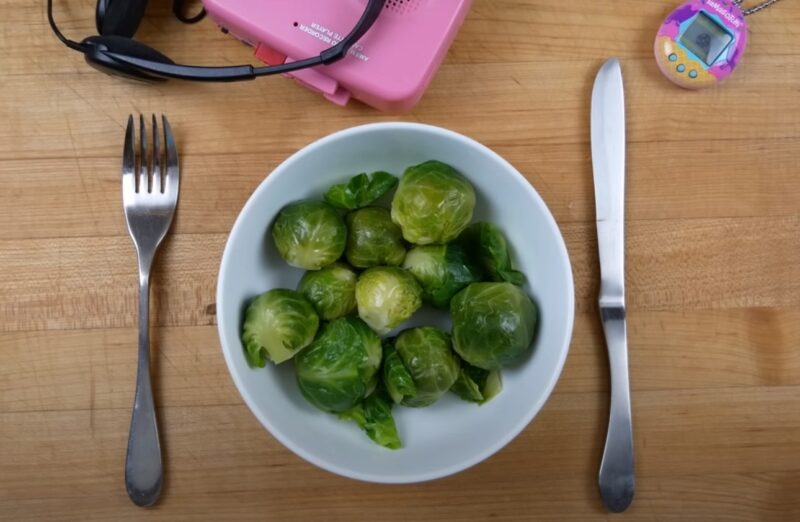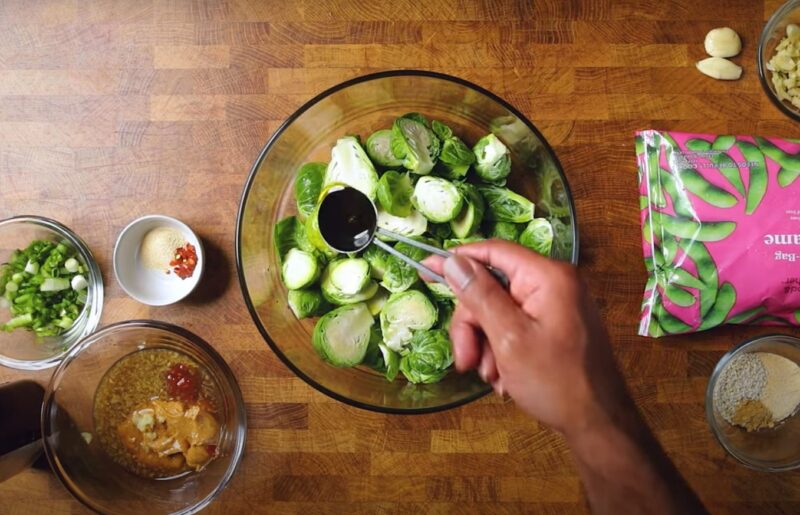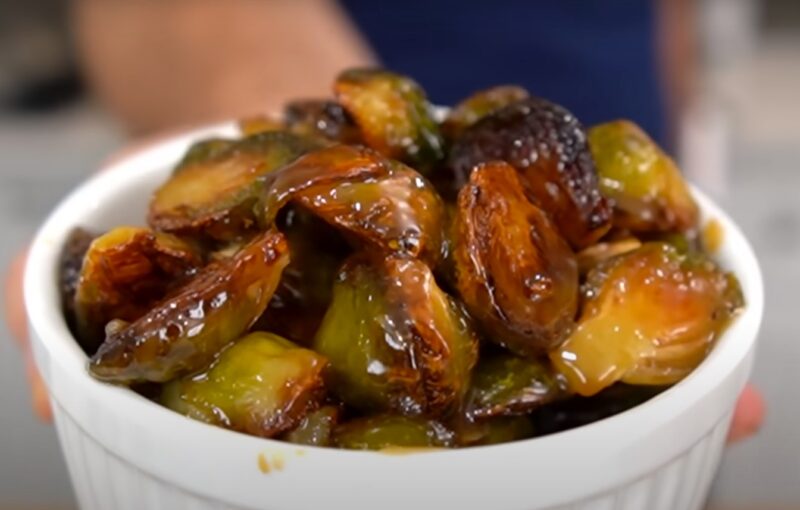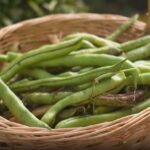These tiny, cabbage-like vegetables offer a versatile range of culinary uses, whether served crisp and raw or tender and cooked. However, many people are wondering whether it is safe to eat in the raw state. We will explore this topic in the following sections.
So, Is It Safe to Eat Them Raw?

The consumption of Brussels sprouts in their raw form is generally considered safe and can be a nutritious addition to the diet. As part of the Brassica family of vegetables, which includes broccoli and kale, these small, leafy greens are packed with an array of vitamins, minerals, and antioxidants, making them a powerhouse of nutrition. When consumed raw, these cruciferous vegetables retain their full nutritional profile, including high levels of vitamin C, vitamin K, and folate, along with dietary fiber and potent phytochemicals.
One of the most significant benefits of consuming these vegetables raw is the preservation of vitamin C, a water-soluble vitamin that is sensitive to heat and can be significantly reduced during cooking. Vitamin C is crucial for immune function, skin health, and iron absorption. Additionally, the fibrous content of the sprouts contributes to digestive health, promoting regularity and contributing to a feeling of fullness, which can aid in weight management.
Despite these considerations, for most people, incorporating raw Brussels sprouts into their diet can be a safe and healthy choice. They can be finely shredded and added to salads, slaws, or even as part of a healthy juice. When introducing them to your diet, it may be beneficial to start with smaller amounts and gradually increase your intake to assess your body’s tolerance.
Also, varying your consumption of vegetables and including a wide range of produce in your diet will help ensure a balance of nutrients and reduce the risk of any potential negative effects from consuming high amounts of any single food.
Are There Any Risks?
There are some considerations to be mindful of when consuming Brussels sprouts raw. One such factor is the presence of raffinose, a type of complex sugar that humans cannot break down. Raffinose can lead to increased gas and bloating in some individuals, particularly those with sensitive digestive systems.
While this doesn’t pose a serious health risk, it can be uncomfortable, and individuals may need to adjust their intake based on their tolerance. There are many misconceptions about raw vegetables. While you can eat this one in such a state, you should avoid some other options, like beans, or green beans, that must be properly prepared.
Nutritional Profile and Health Benefits

Brussels sprouts stand out in the vegetable world due to their impressive nutritional content. Each serving is rich in vitamins C and K, offering a boost to the immune system and playing a vital role in bone health and blood clotting.
Moreover, they are a good source of folate, an essential nutrient for cell function and tissue growth, making them particularly beneficial during pregnancy. The dietary fiber found in these vegetables supports digestive health, aiding in digestion and contributing to a feeling of fullness, which can be beneficial for weight management.
| Nutrient | Amount per 100g |
|---|---|
| Calories | 43 kcal |
| Protein | 3.4 g |
| Carbohydrate | 8.95 g |
| Dietary Fiber | 3.8 g |
| Sugars | 2.2 g |
| Fat | 0.3 g |
| Vitamin C | 85 mg |
| Vitamin K | 177 μg |
| Folate (Vitamin B9) | 61 μg |
| Calcium | 42 mg |
| Iron | 1.4 mg |
| Potassium | 389 mg |
Glucosinolates: The Power of Phytochemicals
One of the most notable components of Brussels sprouts is their glucosinolate content. These sulfur-containing compounds are responsible for the vegetable’s characteristic bitter taste and are studied for their potential anticancer properties.
Upon consumption, glucosinolates are broken down into active compounds that have been shown to induce detoxification enzymes and inhibit the growth of cancer cells. Incorporating Brussels sprouts into your diet can thus contribute to a protective effect against certain types of cancers.
Nutritional Differences: Raw vs. Cooked

When Brussels sprouts are consumed raw, they retain their full vitamin content, especially water-soluble vitamins like vitamin C, which is prone to degradation during cooking. However, cooking can increase the bioavailability of certain nutrients and antioxidants, making them easier for the body to absorb. For example, cooking can break down the cell walls of the plant, releasing more nutrients.
Cooking Brussels sprouts alters their texture, making them softer and often more palatable to those who might not enjoy the crispness of the raw vegetable. The cooking process can also help reduce the effects of raffinose, making the sprouts easier to digest for some individuals. Boiling, steaming, or roasting can reduce the fibrous nature and mitigate some of the gas and bloating associated with raw consumption.
Dishes with Raw Brussels Sprouts
The crisp texture and slightly bitter taste provide a fresh, green canvas that pairs well with a range of flavors from sweet to tangy to savory. When used raw, these little green gems retain all their vital nutrients, offering a punch of vitamins, minerals, and antioxidants. Here are some creative ways to incorporate raw Brussels sprouts into your meals.
Brussels Sprout Slaw
A refreshing alternative to traditional coleslaw, this dish features thinly sliced or shredded Brussels sprouts as the main ingredient. Mixed with a dressing of lemon juice, olive oil, Dijon mustard, and a touch of honey, the slaw is tangy and slightly sweet. Add in some sliced almonds, dried cranberries, and grated Parmesan cheese for a variety of textures and flavors. This slaw is perfect as a side dish, atop burgers, or as a healthy lunch option.
| Ingredients | Recipe |
|---|---|
| – Brussels sprouts (shredded)
– Lemon juice – Olive oil – Dijon mustard – Honey – Sliced almonds – Dried cranberries – Grated Parmesan cheese |
1. Thinly slice or shred the Brussels sprouts.
2. Whisk together lemon juice, olive oil, Dijon mustard, and honey for the dressing. 3. Toss the Brussels sprouts with the dressing. 4. Add in sliced almonds, dried cranberries, and grated Parmesan cheese. 5. Mix well and serve. |
Shaved Brussels Sprout Salad
Shave or thinly slice the sprouts and toss them with a vibrant array of ingredients like apple slices, toasted walnuts, and pecorino cheese. Dress the salad with a simple vinaigrette made from apple cider vinegar, extra virgin olive oil, and a hint of mustard. This salad is not only visually appealing with its mix of colors and textures but also packed with flavors that range from the nutty taste of walnuts to the sharpness of the cheese.
| Ingredients | Recipe |
|---|---|
| – Brussels sprouts (shaved)
– Apple slices – Toasted walnuts – Pecorino cheese – Apple cider vinegar – Extra virgin olive oil – Mustard |
1. Shave or thinly slice the Brussels sprouts.
2. Combine sprouts with apple slices and toasted walnuts. 3. Shave or grate pecorino cheese over the mixture. 4. Whisk together apple cider vinegar, olive oil, and mustard to create the dressing. 5. Toss the salad with the dressing and serve. |
Crispy Brussels Sprout Leaves
For a fun and crispy snack, separate the leaves of the Brussels sprouts and toss them in a light dressing of olive oil, lemon zest, salt, and pepper. Spread them out on a baking sheet and bake just until the edges start to crisp up. These can be enjoyed as a crunchy topping for soups, salads, or as a standalone snack. While not completely raw, this method highlights the versatility of Brussels sprouts, providing a crispy texture that’s quite different from their usual soft cooked counterparts.
| Ingredients | Recipe |
|---|---|
| – Brussels sprout leaves
– Olive oil – Lemon zest – Salt – Pepper |
1. Preheat the oven and prepare a baking sheet.
2. Separate the leaves from the Brussels sprouts. 3. Toss the leaves in a mixture of olive oil, lemon zest, salt, and pepper. 4. Spread the leaves on the baking sheet. 5. Bake until the edges are crispy. 6. Serve as a snack or as a topping. |
Brussels Sprouts Caesar Salad
Redefine the classic Caesar salad by substituting romaine with thinly sliced Brussels sprouts. The sturdy texture of the raw sprouts holds up well against the creamy Caesar dressing. Toss with croutons, a generous sprinkle of grated Parmesan, and a handful of crispy bacon bits for a delightful twist on the traditional Caesar. The result is a more nutrient-dense version of the salad, with an interesting texture and an extra helping of green vegetables.
| Ingredients | Recipe |
|---|---|
| – Brussels sprout leaves
– Olive oil – Lemon zest – Salt – Pepper |
1. Preheat the oven and prepare a baking sheet.
2. Separate the leaves from the Brussels sprouts. 3. Toss the leaves in a mixture of olive oil, lemon zest, salt, and pepper. 4. Spread the leaves on the baking sheet. 5. Bake until the edges are crispy. 6. Serve as a snack or as a topping. |
Mediterranean Brussels Sprout Chopped Salad
Combine shredded Brussels sprouts with chopped cucumbers, tomatoes, red onions, and feta cheese for a Mediterranean flair. Dress the salad with an oregano-infused vinaigrette, incorporating olive oil, lemon juice, garlic, and a touch of honey. This salad is robust with flavors and can stand as a meal on its own or serve as a hearty side dish. The raw Brussels sprouts blend seamlessly with the Mediterranean ingredients, creating a fresh, flavorful, and healthful salad.
| Ingredients | Recipe |
|---|---|
| – Brussels sprouts (shredded)
– Cucumbers (chopped) – Tomatoes (chopped) – Red onions (chopped) – Feta cheese – Olive oil – Lemon juice – Garlic (minced) – Honey – Oregano |
1. Shred the Brussels sprouts.
2. Chop cucumbers, tomatoes, and red onions. 3. Combine all vegetables in a large bowl. 4. Crumble feta cheese over the mixture. 5. Whisk together olive oil, lemon juice, minced garlic, honey, and oregano for the dressing. 6. Dress the salad and toss thoroughly. 7. Serve as a hearty side dish or a main course. |
FAQs
Are raw sprouts hard to digest?
Raw sprouts can be hard to digest for some people, especially those who have gut-related issues. This is because sprouts contain antinutrients, such as phytic acid and lectins, that can interfere with the absorption of minerals and proteins. Cooking or boiling sprouts can reduce the antinutrient content and make them easier to digest.
Is it OK to eat broccoli raw?
Yes, it is OK to eat broccoli raw. Raw broccoli is rich in vitamin C, antioxidants, and sulforaphane, a compound that may have anti-cancer and anti-inflammatory properties. However, some people may find raw broccoli too bitter or fibrous to eat. Cooking broccoli can soften the texture and enhance the flavor, but it may also reduce some of the nutrients.
Are sprouts healthier if it’s raw or cooked?
The answer to this question may depend on your personal preference and health goals. Raw sprouts have higher levels of vitamin C, antioxidants, and sulforaphane than cooked sprouts. However, raw sprouts also have a higher risk of bacterial contamination, which can cause food poisoning. Cooked sprouts are safer to eat and may have better digestibility, but they may lose some of the nutrients and enzymes in the process.
What vegetables can you eat raw?
There are many vegetables that you can eat raw, such as cucumbers, tomatoes, carrots, celery, cauliflower, lettuce, kale, spinach, peppers, radishes, zucchini, and more. Eating raw vegetables can provide you with more vitamin C, fiber, and phytochemicals than cooked vegetables. However, some vegetables, such as potatoes, eggplants, mushrooms, and cassava, should not be eaten raw because they contain toxins or antinutrients that can be harmful.
Summary
Whether you prefer them raw in a crunchy salad or tender and roasted, Brussels sprouts are a versatile and nutritious vegetable that can enhance your diet. Their rich nutritional profile, potential health benefits, and culinary versatility make them a worthy addition to various dishes. By understanding their nutritional impacts, cooking effects, and potential dietary considerations, you can enjoy these little green spheres to their fullest, making them a delicious and healthful part of your culinary repertoire.






